How to use timestamp precision in mysql
This article will introduce to you the usage of 1901 timestamp precision in mysql. It has certain reference value. Friends in need can refer to it. I hope it will be helpful to everyone.
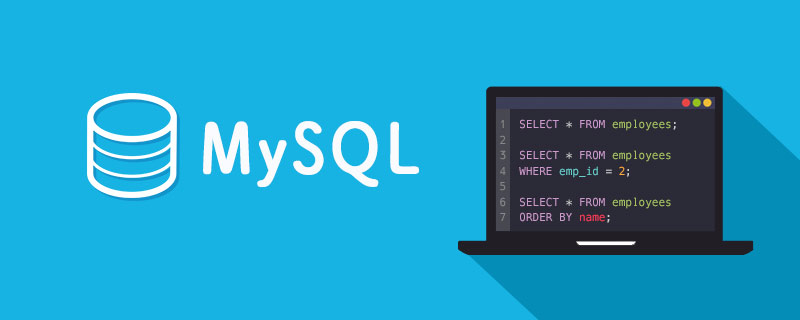
Why does the DATETIME precision in mysql only support seconds?
Is the DATETIME type in mysql related to time zone?
When designing a table in mysql, how to choose the field that represents time?
Case Analysis DATETIME Accuracy Issue
Some time ago, the version of mysql-connector-java for the responsible application was upgraded from 5.1.16 to 5.1.30, and I discovered it when doing functional regression. , the runtime data of use cases similar to the above SQL will be missing, resulting in functional problems.
Considering that in the application I am responsible for, there is a function that requires the use of SQL similar to the following, that is, using the timestamp as the query condition to query all data after a certain timestamp.
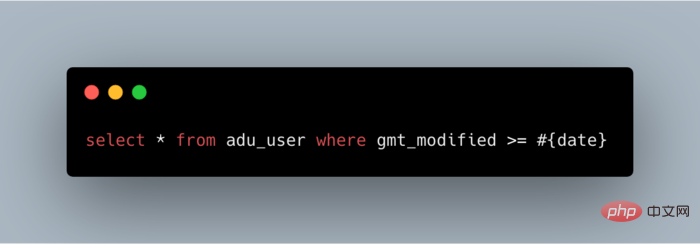
After investigation, it was found that mysql-connector-java would discard the precision after seconds before 5.1.23 and then pass it to the MySQL server, which happened to be in the mysql version we used. The precision of DATETIME is seconds; after I upgraded mysql-connector-java to 5.1.30, when the timestamp is transmitted from the java application to the MySQL server through mysql-connector-java, the milliseconds will not be discarded. From the perspective of mysql-connector-java, it fixes a BUG, but for my application, it triggers a BUG.
If you face this problem, how will you fix it?
We thought of three options at the time:
Change the type of timestamp parameter in the Mapper interface of mybatis from java.util.Date to java.sql.Date;
Before passing it to the Mapper interface, round up the incoming timestamp by seconds. The code is as follows
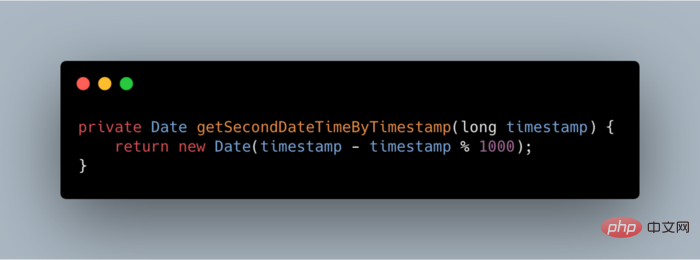
Before querying, decrement the incoming timestamp by 1 Seconds;
It has been verified that in Solution 1, the java.sql.Date object transferred from java.util.Date will lose all the precision after the date, resulting in more unnecessary data being queried; Solution 3 is possible, but one or two more data may be found; Option 2 is also possible, which is equivalent to compensating for the characteristics of mysql-connector-java in terms of code. In the end I chose option 2.
Case Reproduction
Use homebrew to install MySQL. The version is 8.0.15. After installation, create a table to store user information. The SQL is as follows:
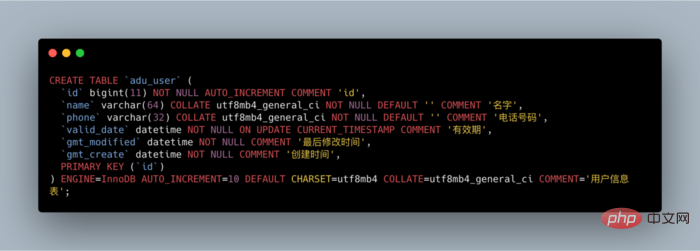
Use spirngboot mybatis as the development framework to define a user entity. The code is as follows:
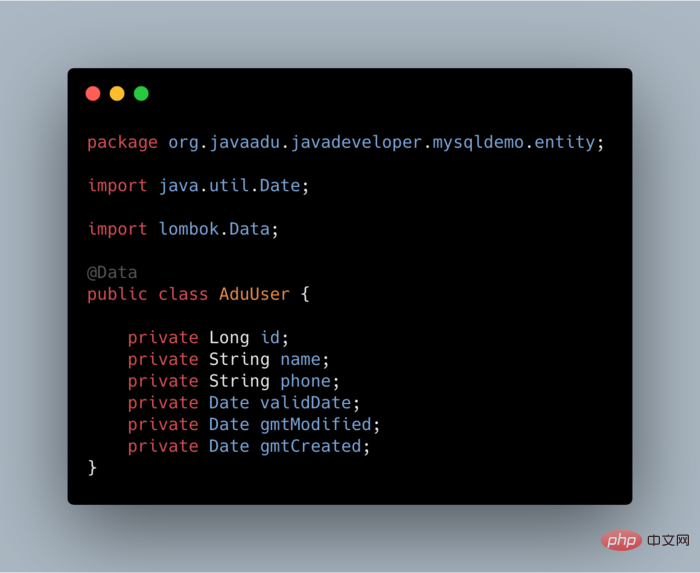
Define the Mapper corresponding to the entity. The code is as follows:
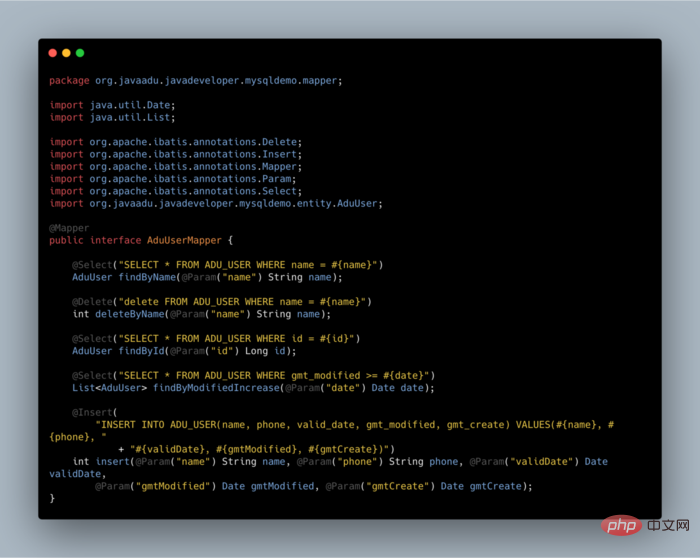
Set the configuration related to connecting to mysql, the code is as follows:

Write the test code, first insert a piece of data, and then use The timestamp is used as a query condition. The code is as follows:
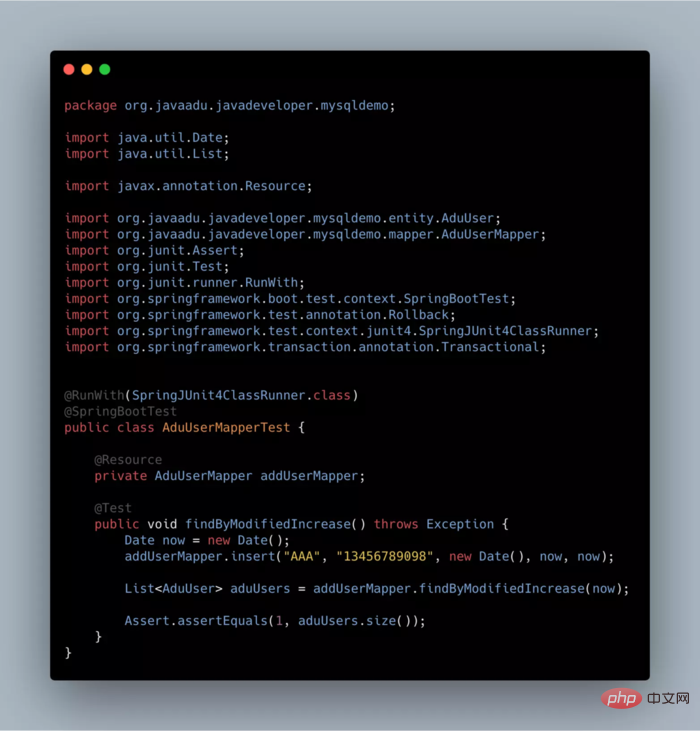
When running a single test, as we imagined, no data was queried. The results are as follows:

Then modify the code and use the above code to correct the query timestamp by seconds. The code is as follows:
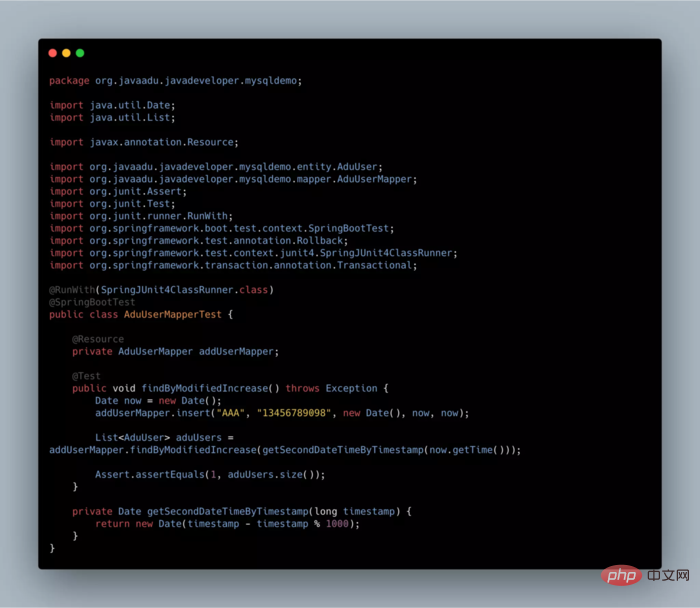
Run the single again Test, as we imagined, the data can be queried this time.
However, here is a small episode. When I first designed the table, the SQL statement I used was as follows,
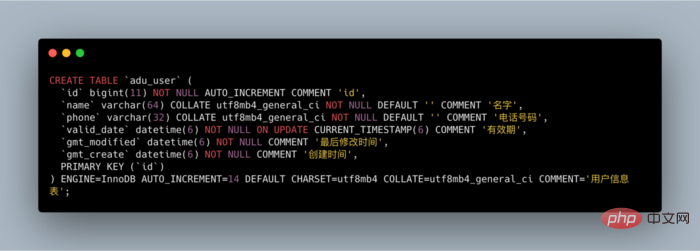
Smart as you are You must have discovered that the datetime here already supports smaller time precision after the decimal point. It supports up to 6 digits, that is, it can support up to the microscopic level. When was this feature introduced? I checked [MySQL's official documentation][9] and found that this feature was supported after mysql 5.6.4.
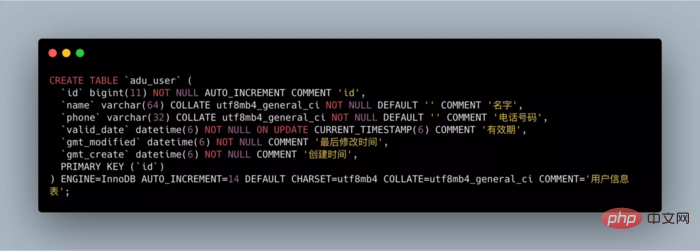
Summary of knowledge points
After the previous actual case analysis and case recurrence, readers must have a certain understanding of the DATETIME type in mysql. Next, let’s take a look at what experiences we can summarize from this case.
The version of mysql-connector-java and the version of mysql need to be used together. For example, for versions before 5.6.4, it is best not to use versions before 5.1.23 of mysql-connector-java, otherwise it may Will encounter the problems we encountered this time.
The field types used to represent time in MySQL are: DATE, DATETIME, and TIMESTAMP. They have similarities and each has its own characteristics. I have summarized a table as follows:

The DATETIME type is stored as an integer in the format of "YYYYMMDDHHMMSS" in MySQL. It has nothing to do with the time zone and uses 8 bytes of space;
TIMESTAMP type can be saved The time range is much smaller, and the displayed value depends on the time zone. The MySQL server, operating system, and client connection all have time zone settings.
Generally, it is recommended to use DATETIME as the timestamp field, and it is not recommended to use the bigint type to store time.
During development, you should try to avoid using timestamps as query conditions. If you must use them, you need to fully consider the accuracy of MySQL and the accuracy of query parameters.
Recommended learning: php video tutorial
The above is the detailed content of How to use timestamp precision in mysql. For more information, please follow other related articles on the PHP Chinese website!

Hot AI Tools

Undresser.AI Undress
AI-powered app for creating realistic nude photos

AI Clothes Remover
Online AI tool for removing clothes from photos.

Undress AI Tool
Undress images for free

Clothoff.io
AI clothes remover

Video Face Swap
Swap faces in any video effortlessly with our completely free AI face swap tool!

Hot Article

Hot Tools

Notepad++7.3.1
Easy-to-use and free code editor

SublimeText3 Chinese version
Chinese version, very easy to use

Zend Studio 13.0.1
Powerful PHP integrated development environment

Dreamweaver CS6
Visual web development tools

SublimeText3 Mac version
God-level code editing software (SublimeText3)

Hot Topics
 MySQL's Role: Databases in Web Applications
Apr 17, 2025 am 12:23 AM
MySQL's Role: Databases in Web Applications
Apr 17, 2025 am 12:23 AM
The main role of MySQL in web applications is to store and manage data. 1.MySQL efficiently processes user information, product catalogs, transaction records and other data. 2. Through SQL query, developers can extract information from the database to generate dynamic content. 3.MySQL works based on the client-server model to ensure acceptable query speed.
 How to start mysql by docker
Apr 15, 2025 pm 12:09 PM
How to start mysql by docker
Apr 15, 2025 pm 12:09 PM
The process of starting MySQL in Docker consists of the following steps: Pull the MySQL image to create and start the container, set the root user password, and map the port verification connection Create the database and the user grants all permissions to the database
 Laravel Introduction Example
Apr 18, 2025 pm 12:45 PM
Laravel Introduction Example
Apr 18, 2025 pm 12:45 PM
Laravel is a PHP framework for easy building of web applications. It provides a range of powerful features including: Installation: Install the Laravel CLI globally with Composer and create applications in the project directory. Routing: Define the relationship between the URL and the handler in routes/web.php. View: Create a view in resources/views to render the application's interface. Database Integration: Provides out-of-the-box integration with databases such as MySQL and uses migration to create and modify tables. Model and Controller: The model represents the database entity and the controller processes HTTP requests.
 Solve database connection problem: a practical case of using minii/db library
Apr 18, 2025 am 07:09 AM
Solve database connection problem: a practical case of using minii/db library
Apr 18, 2025 am 07:09 AM
I encountered a tricky problem when developing a small application: the need to quickly integrate a lightweight database operation library. After trying multiple libraries, I found that they either have too much functionality or are not very compatible. Eventually, I found minii/db, a simplified version based on Yii2 that solved my problem perfectly.
 How to install mysql in centos7
Apr 14, 2025 pm 08:30 PM
How to install mysql in centos7
Apr 14, 2025 pm 08:30 PM
The key to installing MySQL elegantly is to add the official MySQL repository. The specific steps are as follows: Download the MySQL official GPG key to prevent phishing attacks. Add MySQL repository file: rpm -Uvh https://dev.mysql.com/get/mysql80-community-release-el7-3.noarch.rpm Update yum repository cache: yum update installation MySQL: yum install mysql-server startup MySQL service: systemctl start mysqld set up booting
 Centos install mysql
Apr 14, 2025 pm 08:09 PM
Centos install mysql
Apr 14, 2025 pm 08:09 PM
Installing MySQL on CentOS involves the following steps: Adding the appropriate MySQL yum source. Execute the yum install mysql-server command to install the MySQL server. Use the mysql_secure_installation command to make security settings, such as setting the root user password. Customize the MySQL configuration file as needed. Tune MySQL parameters and optimize databases for performance.
 Laravel framework installation method
Apr 18, 2025 pm 12:54 PM
Laravel framework installation method
Apr 18, 2025 pm 12:54 PM
Article summary: This article provides detailed step-by-step instructions to guide readers on how to easily install the Laravel framework. Laravel is a powerful PHP framework that speeds up the development process of web applications. This tutorial covers the installation process from system requirements to configuring databases and setting up routing. By following these steps, readers can quickly and efficiently lay a solid foundation for their Laravel project.
 MySQL and phpMyAdmin: Core Features and Functions
Apr 22, 2025 am 12:12 AM
MySQL and phpMyAdmin: Core Features and Functions
Apr 22, 2025 am 12:12 AM
MySQL and phpMyAdmin are powerful database management tools. 1) MySQL is used to create databases and tables, and to execute DML and SQL queries. 2) phpMyAdmin provides an intuitive interface for database management, table structure management, data operations and user permission management.






